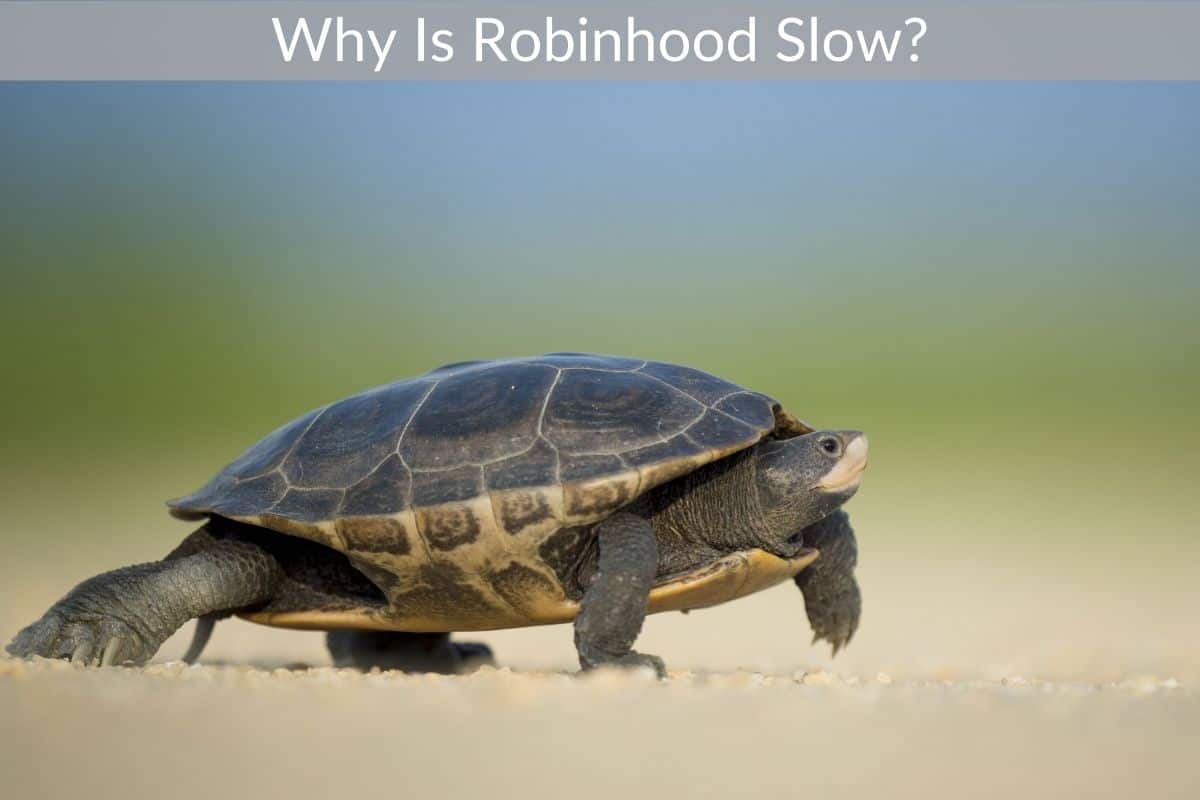Table of Contents
Robinhood’s clients experience many problems, from customer service issues to account restrictions for different reasons. While the severity of these different troubles varies among the 22.5 million users, innumerable clients have one common question: why is Robinhood slow?
*This post may contain affiliate links. As an Amazon Associate we earn from qualifying purchases.
Robinhood is slow for users having poor internet connectivity or speed and system, device, or app-related issues. The platform is also slow during IPOs, trading halts, and market volatility.
Besides, unfortunately Robinhood doesn’t execute the trades, so a delay is inevitable.
The trading and investing app Robinhood is not a digital equivalent of a traditional brokerage. Unlike discount or full-service brokerages, Robinhood forwards all its orders to a third party for execution, thus slowing the process.
Read on to know some other reasons why Robinhood might be slow for you.
Why Is Robinhood Slow At Order Filling And Trade Execution?
Almost every Robinhood client experiences delays in order filling and trade execution. Many users frequently endure painfully slow trade processing and completion.
Robinhood has listed several reasons explaining why customer orders are not filled, but the company does not explain one crucial fact.
Here are the 9 reasons currently cited by Robinhood for slow responsiveness:
- Limited Volume
- Market Open Conditions
- Extended Hours
- Limited Support at Execution Venues
- Limit or Stop Price Hasn’t Been Reached
- Limit Price Reached, but Order Not Filled
- Unstable Market Conditions
- IPO (Initial Public Offering)
- Collared Market Buy Orders
Robinhood mentions ‘execution venues’ in the 4th point, but it doesn’t have its own trading centers. The popular commission-free trading app routes its orders or trades through the likes of Citadel Securities and Two Sigma Securities.
Robinhood is slow with its order filling & trade execution as it relies on third parties for the complicated processes. The app merely lists a buy or sell offer. Everything thereafter is the responsibility of the market makers and other brokerages involved, not Robinhood.
Citadel Securities and Two Sigma Securities are market makers. These companies execute the trades for Robinhood based on an arrangement known as payment for order flow (PFOF).
Since the entire service is based on the PFOF financial model, order flows are a vital component.
Clients and outsiders do not know the precise frequency of when and how many orders Robinhood forwards to market makers or other brokerages. No second or third party other than those involved in the actual operations learns about any internal slowdowns, intentional or not.
The SEC is contemplating a ban on payment for order flow, and Nasdaq is already wondering about possible alternatives. Many are wondering if Robinhood needs PFOF.
Meanwhile, Senator Pat Toomey has introduced a bill to prevent the SEC from taking any such action.
Why Does Robinhood Take So Long To Buy or Sell?
Robinhood takes so long to buy or sell because there may be no seller or buyer at the time respectively. Also, sometimes the app cannot trade due to volume issues, an asset’s real-time value, an order’s stop or limit price, and market conditions.
User or account-specific problems can exist, too.
By its admission, Robinhood imposes restrictions on trading when the market is volatile or particular stocks encounter wild fluctuations due to prevailing trends.
The app must stop filling orders and executing buy or sell offers when there is a trading halt. However, Robinhood can and does impose restrictions that are not mandated by the SEC, policies of stock exchanges, and other applicable laws.
Any restriction imposed on a specific user or account and in general for all clients will slow down the app’s order filling, trade execution, and other activities. Users experience problems and slowdown in withdrawals, too, which was evident during the GameSpot-related trading halt.
Robinhood Is Slow Due To The Lack Of Buyers Or Sellers
Robinhood is not immune to the typical hurdles faced by traditional brokerages, too. Every buying or selling offer needs a willing party to execute and complete the trade.
Robinhood does not necessarily trade all available orders amongst its clients. The orders or trades are routed to market makers and brokerages.
Thus, those centers have to find a buyer or seller to execute a trade. In the absence of any party, your order will be pending, then canceled.
Price Mismatches Can Delay Trade Execution
Many Robinhood clients encounter the price mismatch issue. According to the app, the price you see displayed for an asset is the last traded value. The real-time price may not be the same when your order is filled and processed.
Thus, your buy or sell trade may not get executed at all. The order will remain pending if you have a stop or limit price.
Even if an offer matches your stop or limit price, other factors could keep the trade pending, and eventually, canceled.
Trades Are Slow When Volume Issues Arise
Your trades through Robinhood depend on several pertinent elements, not just the price or availability of a willing party. The trade volume is a significant factor.
Your trade to sell 100 shares can be completed only when someone is willing to buy precisely that many (or more) shares.
Issues such as size and type mismatch, volume, liquidity of selected securities, and even Robinhood’s system performance can slow down the entire process.
Besides, all other inherent problems of the app are still concurrently at play, further slowing your order filling and trade.
How Can I Check If Robinhood Is Slow Or Down?
A pending trade can test anyone’s patience, more so if the order is eventually canceled. Also, you may not know if Robinhood is slow only for you or many, or perhaps down for everyone.
First, check if your account is restricted for any reason. Then, check the app’s operational status.
Use the Robinhood down detector to know if the app is slow or down, affecting many users with issues related to app performance, trades, or withdrawals, in general. You can also use the Robinhood status checker to know if one or all of its systems are currently operational.
Sometimes, the Robinhood app is slow for specific users due to technical glitches. Try standard troubleshooting processes to fix such issues.
Here are a few easy solutions:
- Check the internet connection, Ethernet or WiFi.
- Use cellular data to test if the app works as expected.
- Ensure you have the latest version of the Robinhood app.
- Log out from the app, delete cache files, reboot the device, and log in.
- Force quit the Robinhood app, or uninstall & reinstall it if nothing else works.
Final Thoughts
Stay abreast of news about trading halts, market volatility, app outages, and other reasons that Robinhood may use to slow down, pause, or restrict its processes for select users or everyone.
In recent times, Robinhood has displayed tendencies to limit its operations due to various developments. These decisions are debatable, but the real-time hassle for users is unacceptable.
Hopefully, the realities explained in this guide and the few solutions will help you.

